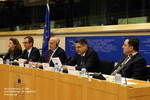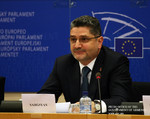Thursday, 17 March 2011
Tigran Sargsyan: “International community should send a clear indication that there is no alternative to peaceful settlement.”
On the sidelines of his visit to the Kingdom of Belgium, Prime Minister Tigran Sargsyan delivered a statement at the External Relations Committee of the European Parliament after which he answered the journalists’ questions.
Below you will find the Prime Minister’s answers and the questions which may be grouped in 3 main areas:
“The first group of the questions relate to the Nagorno-Karabakh conflict. I feel you wish the conflict were settled for which I am sincerely grateful to you.
I would like to present my vision of the ways the EU and the European Parliament could help us settle the problem: any conflict implies two different approaches to the same issue. Therefore, the conflicting sides should be prepared for a negotiated settlement. But they cannot be helped should either one of them think otherwise.
A fundamental principle must be abided by in tackling the Nagorno-Karabakh issue, namely that there is no alternative to peaceful settlement. If so, my answer to your question is that the international community should send a clear indication that the international community will apply rigorous sanctions against such conflicting side as will try to resort to the use of force. I can assure you that this is the best way of helping us to achieve a negotiated settlement of the conflict.
I do believe that the progress recorded by the OSCE Minsk Group and the successful efforts made so far by the USA, Russia and France, as well as those compromise-based solutions suggested by them may provide a basis for peaceful settlement.
I am convinced that having such an indication on the part of the international community, both sides will be compelled to considerably reduce their military spending. Instead, realizing that there is a chance of forced solution, either one of them can boost its military spending and wreck the process of negotiations.
How can Europe help us, if the conflicting sides have different perceptions of justice and different visions of conflict settlement: the perception of justice has to do with the system of values.
This thesis of mine will be used to answer your next question: what kind of assistance may the EU provide to help reinstate peace in the region. As stated above, the best way is to shape a single platform of values.
If we come to an agreement over the system of values, it would be easier for us to offset the differences. To my mind, the only one way to achieve this is that that Azerbaijan, Georgia, Turkey and Armenia declare that euro-integration and the European system of values are of utmost importance to them. Note that all of them are implementing reforms aimed at European integration.
It is obvious that the values advocated by us and the way things stand now are at odds as a matter of fact: there is gap between reality and the values proclaimed. In my opinion, strong commitment to bold reforms on the way to euro-integration is the key to the shaping of a single platform of values, which means that the countries of our region need to be assisted by the European Union with the buildup of reform capacity. Successful euro-integration-oriented efforts may lead to successful settlement of the conflict as the problems will be approached from a common standpoint.
The next question of interest is about our stance on the closure of the existing nuclear power plant and the construction of the new reactor. This issue soared high on the international agenda especially after the latest developments of Japan giving rise to heated debates in all those countries with nuclear power plants. Either we are considering ways of enhancing the level of nuclear safety at our plant. In this respect we are working with competent international organizations.
The cooperation is open and transparent. On the one hand, we are taking specific steps to ensure compliance with the safety requirements and, on the other hand, we are getting assistance from abroad inclusive of the European Union in order to toughen the safety standards. Thanking our partners for assistance, I would like to assure you that we will review once again the whole set of safety problems relating to the Medzamor NPP.
The next question bears on Armenia’s relations with Turkey. We are eager to see Turkey succeeding on the way to European integration as we wish to have a democratic, economically developed neighbor living with European values. This is the key to regional security and may trigger economic development in Armenia.
In this respect, our policy has remained unchanged over the last two decades. We are prepared to establish diplomatic relationship with neighboring Turkey without preconditions. A proof of it was our signing of the protocols in Switzerland and President Serzh Sargsyan’s statement on Armenia’s readiness to ratify them.
Moreover, the Constitutional Court of the Republic of Armenia issued a favorable opinion. Unfortunately, we can see that Turkey has been subject to serious pressures and is not yet prepared to establish relations with Armenia without preconditions.
The fourth questions relates to Armenian communities of Diaspora. The Armenian nation is a single body and any part of it cannot be opposed to the rest of the organism. This is an erroneous and challenging approach. Many nations have diasporas worldwide. While having a common identity and advocating common values they may have different opinions and viewpoints, and this is quite natural.
Indeed, there is a plurality of opinions in both Armenia and the Diaspora on the ways of settling Armenia-Turkey relations. We lost one of our coalition partners because of the opposition available inside the country. Therefore, existing differences should not be construed unilaterally, namely that Armenia favors the process and the Diaspora not.
The next issue is that of Armenia’s relations with our strategic partner Russia which plays a key role in our country. Furthermore, there are Russian armed forces stationed in Armenia due to Armenian authorities’ well-devised and balanced decision: we must provide for our people’s safety amid most serious unsettled problems in the region, including ones had with our next-door neighbors, which are ten times as powerful in economic and military terms. We, the Armenians have been subject to genocide, and the instinct of physical survival is deeply rooted in our sub-conscience.
Unilateral foreign military presence will no longer be needed in the region should the existing geopolitical risks be minimized as a result of democratic reforms. If we succeed along this path, an atmosphere of confidence will be established ruling out the necessity of foreign military presence.
Coming down to the question of the customs union, note that that Russia, Kazakhstan and Belarus are discussing this issue with other CIS countries as well. As far as Armenia is concerned, I should note that our country is a WTO-member State and has enacted such legislative standards as stem from the accession agreement.
Either Russia is seeking WTO-membership and has been taking serious steps to that end. So far, there is no record of a country acceding to a customs union without having common physical borders with it. This is unfeasible both technically and theoretically. Therefore, Armenia cannot become a member of Belarus-Russia-Kazakhstan customs union unless Georgia does so in future.
To my mind, the most realistic scenario is that Armenia will continue along the path of European integration. In view of the above, we look forward to contracting full membership of the all-comprehensive and deep agreement on free trade in Europe which the focus of our reform efforts.
The next question bears on EURONEST. Our stance is as follows: we have participated in this process and will do so in future. We appreciate it as we can see that an important political platform is being shaped where parliamentarians may discuss questions of mutual interest and concern. EURONEST can provide additional incentives for euro-integration. We will keep on helping it come true.
There was a question about elections. We are in for parliamentary elections next year, and we should make every effort to hold them in accordance with the best European standards. I wish to state the following in reply to your question: we must push ahead with the EU-assisted reforms so that Armenia could grow into a more democratic State supplied with market-oriented laws and regulations.
The faster reforms progress, the greater resource of confidence our government may win. And this is just the pledge of more open, transparent and fair elections in 2012.








